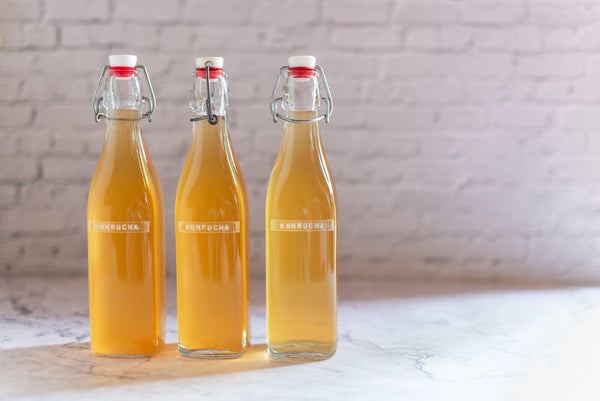
Jump to:
When you hear “kombucha” what’s the first thing that comes to mind? That bubbly, fermented sweet and sour tea drink? What if we told you that in Japan, there’s a beverage that goes by the same name but is completely different?
If you ask a Japanese person about kombucha, the fermented bubbly health beverage you’re familiar with might not be the drink that pops up in their mind. Yes, there is a similar-sounding drink in Japan called konbucha, but, as its name suggests, the base of the drink is kombu (kelp seaweed). In fact, the word konbu (often spelled as kombu in English) directly translates to kelp tea, as konbu = kelp and cha = tea.
But wait, can kelp tea actually be any good?! In this article, we’d like to cover the differences between kombucha and konbucha, as well as highlight the best Japanese kombucha products you can buy online. After reading this article, we hope that you’ll be able to confidently distinguish the differences between the two, and decide for yourself which tea-based drink is your favorite.
What Is Kombucha?

If you’re not familiar with the fizzy tea beverage that’s been all the rage in the past few years or so, let’s briefly talk about it. Kombucha is a fizzy, slightly tangy, and fermented tea drink made from, you guessed it, tea. Sweetened tea is fermented with a culture of bacteria and yeast called SCOBY. During its fermentation, SCOBY metabolizes the sugar in the tea, converting it into various compounds, including organic acids and carbon dioxide, giving kombucha its iconic fizziness and sour flavor.
Kombucha is usually made from a base of black tea, but green tea, oolong tea, or other types of tea can also be used. After kombucha goes through its initial fermentation, you can also add your favorite fruits to jazz up its flavor.
What Is Konbucha?

Konbucha is completely different from Kombucha. As we’ve already mentioned, konbucha is literally kelp tea, meaning that the base is kelp. To make konbucha, dried konbu pieces are typically either shredded or transformed into a fine powder—easy as that! The final konbucha product can be added to hot water to make an umami-rich tea or can even be used in cooking.
Brief History of Konbucha
You might be thinking, that sounds incredibly simple! And yup, you’re right. However, konbucha has quite a long history dating back to the Edo period (1603 to 1868), when people would take sheets of konbu, steep them in hot water to create tea, and then enjoy the softened konbu remnants. It wasn't until 1918 that powdered konbucha became available. During this era, instant beverages like freeze-dried coffee were gaining popularity due to their convenience, so it's no surprise that powdered konbucha found its place among them.
People loved the versatility of powdered konbucha. While yes, it can be whipped up into a quick hot tea packed with umami flavor, it could also be used to make an instant dashi broth. It could be a huge time saver in the kitchen!
Types Of Konbucha

In Japan, konbucha falls into three distinct categories: plain konbucha, plum-seasoned konbucha, and shredded kelp konbucha. We've primarily focused on plain konbucha in this article, which is essentially dried powdered kelp. Occasionally, manufacturers enhance its flavor and color by incorporating ingredients like sugar, salt, or matcha powder.
Next up, we have plum-seasoned konbucha, known as 'umekonbucha.' As the name suggests, this version features dried umeboshi plums, either powdered or diced into small pieces, to infuse a unique sour flavor. It's a delightful choice for those who appreciate the taste of umeboshi plums!
Last but not least, there's shredded kelp konbucha, made from dried and shredded konbu kelp. While it's often preferred for making kombu dashi, it most definitely can be enjoyed as a tea as well.
Konbucha Health Benefits
As to be expected, konbucha is packed with health benefits. Konbu contains ingredients like fucoidan, which supports the good bacteria in your gut, helping with digestion and reducing constipation. Konbu is also rich in iron and minerals, which are essential for alleviating anemia and cold sensations. Finally, konbu is loaded with potassium, calcium, and magnesium that can provide relaxation and stress relief. So, besides being tasty, drinking konbucha can be good for you in several ways!
Konbucha (And Kombucha) Products
After learning about konbucha, you might want to try it out for yourself. In this section, we’d like to highlight the best konbucha (as well as kombucha) products that you can find on Japanese Taste.
Izuri Konbucha Natural Japanese Kelp Tea Powder 40g
This Konbucha from Izuri, a reputable Konbu seaweed producer, contains real dried and powdered Japanese kelp. Since konbucha does not contain any tea leaves, the powdered kelp easily and completely dissolves into water, allowing you to take in all of the nutritional benefits of konbu.
What’s also great about this particular konbucha is that you can use it as an umami-boosting seasoning for any dish. Simply add your desired amount of konbucha into soups, stir-fries, eggs, or any other dish, and bam! You’ve got an umami-packed and delicious meal.

[callout-1]
Izuri Konbucha Natural Ume Plum & Kelp Tea Powder 40g
If you’re an umeboshi lover and want to enjoy its uniquely sour flavor with your konbucha, you can with this delicious ume plum-flavored konbucha! Similar to Izuri’s original konbucha, the base of this tea is dried kelp powder, but ume plum vinegar has been added to give the tea that iconic umeboshi flavor. Enjoy drinking this tea or even adding it to your favorite dishes.

[callout-2]
Orihiro Kombucha Supplement 90 Capsules
Since kombucha has such a distinctive flavor, it may not be everyone’s cup of tea. If you still want to receive the health benefits of kombucha without having to drink it, you can with this dietary supplement from Orihiro!
This kombucha-based supplement contains kombucha extract, which is obtained from the fermentation of black tea. Additionally, it contains lactic acid bacteria and activated carbon as supportive components. It’s a great supplement option for those who have irregular lifestyles or are lacking a balanced diet.

[callout-3]
What do you think about Konbucha? Do you want to try it out for yourself? Let us know your thoughts about kombucha and konbucha in the comments below.


0 comments